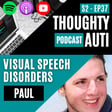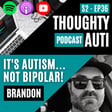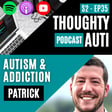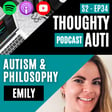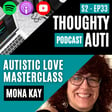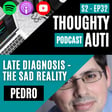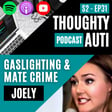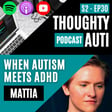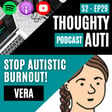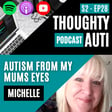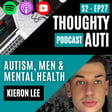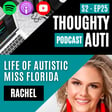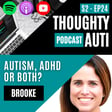
Neurodiversity and Creativity - Group Special with Neurodivergent Crew
How does Neurodiversity impact creativity? What negative life experiences come from DID, ADHD, Autism, and Dyslexia? Why does music have a positive effect on mental health?
TW: Mental illness, Loss, Addiction
The Neurodivergent Crew is a collection of four neurodivergent artists who seek to express their neurodivergence and life stories through music. N00trix is a dark trap artist and producer, 12-Gauge is a rap artist, FMA is a metal vocalist and Dreadn0ught is the man behind their beats.
In this special group episode, Thomas interviews these four guests about their life stories, their music background, and how creativity has brought a positive influence on their lives.
NDC Links - https://linktr.ee/neurodivergentcrew // My Links - https://linktr.ee/thomashenleyUK
Thomas starts off the episode by introducing the guests and diving into their music background: FMA used to perform live metal music on stage, but found that his son 12-Gauge had taken a shine to rap music; they started living together and talk about their first father-son duo experience at 12-Gauges young age of 15. A previous drummer, Dreadn0ught was introduced to the group whilst studying media at University, and N00trix was the final piece in the puzzle. N00trix contacted the triple over Instagram, instantly finding common ground and providing a production role to bring in the group's talents together.
Diving into their personal history, N00trix explains the defining moment where her personality split in two through Dissociative Identity Disorder (commonly termed as multiple personalities). She explains how the stigma of the disorder separated her from her family and previous life, but also ignited her passion to share her more pessimistic and dark outlook on life… through music.
FMA talks about his experience with a very late Autism diagnosis, as well as his experience with addiction and rehabilitation through his 20s and 30s. His son 12-Gauge, explains the impact that undiagnosed Dyslexia and bullying had on his school experience and his own self-confidence. He was fortunate to have FMA as a father figure, allowing him to dodge the addiction traps his father succumbed to in his youth. Thomas bonds with the two on this due to his history of alcoholism and exercise addiction.
Dreadn0ught opens up about his experiences with ADHD, stating that it was important to know for his own understanding, and not necessarily therapy. Plunging into deep mental illness and addiction following his friend's passing at University, he remarks on the existential loneliness he experienced at University.
With all the experiences discussed, they finish by talking about the impacts their individual neurodivergencies had on their music career in the present day. This is undoubtedly a big dive into Neurodiversity, as well as all the many strings that connect them together and what the crew to brought them into the music scene… I hope you enjoy it!
Song Of The Day (Listen Here) - https://open.spotify.com/playlist/5UDIyN5TSYN4zMcRoQPrG8?si=9255ed3480d840b5
Interview me, 1:1 Autism coaching, public speaking for events, workplace training - https://www.thomashenley.co.uk






